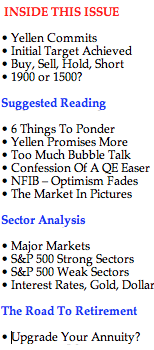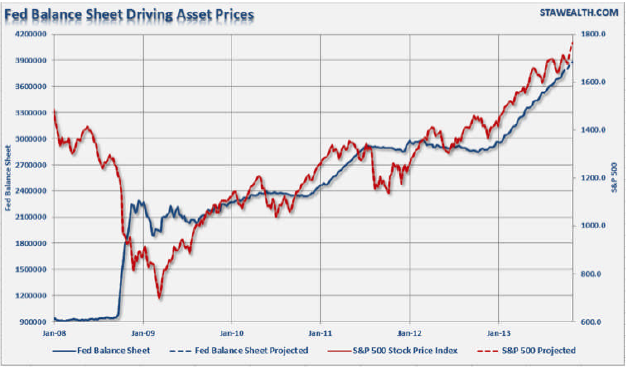
 Lance’s thorough Stock Market Analysis – Ed
Lance’s thorough Stock Market Analysis – Ed
To start this week’s missive I want to share with you an excerpt from Randall Forsythe’s “Up and Down Wallstreet” column this weekend:
“IN A NEW STUDY, McKinsey & Co. concluded the Fed had no role in boosting stock prices and hence there is no bubble. Truth to tell, the consultancy had slipped from my consciousness since it extolled Enron as “one of the world’s most innovative companies,” instead of a criminal enterprise. Of course, since then, former McKinsey managing director Rajat Gupta was convicted of insider trading. McKinsey advised AT&T there wasn’t much future in mobile phones (which Bell Labs invented); advised General Electric, which lost $1 billion by following its advice; recommended that U.K. rail company Railtrack cut infrastructure spending, leading to fatal accidents and Railtrack’s collapse, among other great calls.
In particular, McKinsey asserts there has not been a large-scale shift to equities in search of higher returns. To be fair, the consultancy’s paper preceded the report from colleague Brendan Conway on Barrons.comthat inflows into equity mutual funds and exchange-traded funds are on track to top $450 billion in 2013 — more than the previous four years combined. Anybody can overlook nearly a half-trillion bucks in concluding there’s been no big shift to stocks.
McKinsey based its conclusions on the observation that price/earnings ratios and price-to-book ratios aren’t out of line. Yellen pointed out the equity-risk premium — the expected extra return from stocks over risk-free government bonds — adequately compensates investors. On the latter score, the equity-risk premium is flattered by the low level of Treasury yields — QE’s explicit goal. As for P/Es being moderate, that’s helped by the numerator being boosted by the reduction of interest expense — some $319 billion since 2007, according to ever-invaluable analysis from MacroMavens’ Stephanie Pomboy.
Even with this detachment from reality, and fundamentals, the markets advanced higher this week as Janet Yellen promised MORE, and potentially MUCH MORE, accommodative policy in the future.
Not coincidentally, the Wall Street Journal reports investment-grade corporate-bond issuance is running at a $1 trillion annual rate as companies take advantage of historically low rates, with which the Fed has had something to do. Moreover, the release of banks’ loan-loss reserves has added $112 billion to financial companies’ profits in the past two years, Pomboy says, which just might have something to do with higher house prices.
At the same time, an analysis by a famous hedge fund (whose name I can’t reveal or they’d kill me or I’d have to kill you) finds profits at non financial companies have been flat since 2011. Thus, the rise in their stock prices implies higher P/Es — consistent with the effects of monetary stimulation.

What is probably most disturbing though is that Janet Yellen does NOT
BELIEVE, despite mounting evidence to the contrary, that investment risk is
rising:
- Yellen Says Fed Doesn’t See Buildup Of Financial Risks
- Yellen Sees Limited Evidence Of ‘Reach For Yield’
- Yellen Says Fed Looks Out For Any Potential Asset Price Bubbles
- Yellen Doesn’t See `Misalignments’ In Asset Prices
….read more HERE













